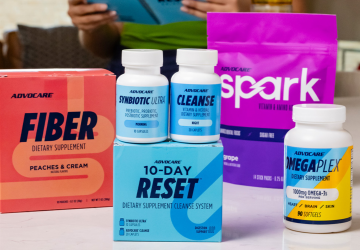Let’s be honest—nobody wants to catch a cold or get sick, especially when the holidays are just around the corner! As the seasons shift, it’s the perfect moment to focus on healthy habits to support your immune system. While there’s no magic potion that can promise immunity, making some simple lifestyle tweaks and choosing the right supplements can support your fall and winter wellness routine.
Eat a Balanced Diet for additional vitamins and minerals
First and foremost, prioritizing a balanced diet is essential. Eating a colorful variety of fruits and vegetables is like giving your immune system a superhero cape. Foods rich in vitamins C and D, zinc, and antioxidants can help fend off annoying germs in our environment. A study published in the Journal of Clinical Medicine found that vitamin C can reduce the duration and severity of colds,* so loading up on oranges, strawberries and bell peppers is a great way to support your immune health. Incorporating seasonal fruits and vegetables into your diet as snacks, stews and soups is another easy way to increase nutrient dense foods in your diet.
To support your nutritional needs, consider CorePlex®, a multivitamin with 36 vitamins, minerals, and nutrients that provide foundational components that support overall health and act like your immune system’s trusty sidekick.
C-Grams® is another source of vitamin C that contributes to maintaining health and normal immune function.* With 1,000 mg of vitamin C in each serving this supplement can be an easy addition to your whole food diet. Vitamin C has also been shown to have positive effects on cardiovascular health. In addition, C-Grams includes a citrus extract and the amino acid L-Lysine to help maximize the nutritional profile by effectively complementing vitamin C.* During the fall and winter months, several fruits and vegetables are in season that can support your immune health. Here are some great options:
Fruits :
- Citrus Fruits: Oranges, grapefruits, lemons, and limes
- Pomegranates: Packed with antioxidants and vitamin C
- Apples: Rich in fiber and vitamin C
- Pears: High in vitamin C and fiber
Vegetables :
- Sweet Potatoes: High in beta-carotene (which converts to vitamin A), sweet potatoes support immune health and promote healthy skin. *
- Carrots: Another excellent source of beta-carotene, carrots can help enhance immune function* and are versatile for snacking or cooking.
- Broccoli: Packed with vitamins A, C, and E, along with antioxidants, broccoli is a nutrient powerhouse for immune support. *
- Kale: This leafy green is rich in vitamins A, C, and K, and it contains antioxidants that can enhance your immune response. *
Hydrate, Hydrate, Hydrate
When it gets colder, folks tend to not drink as many fluids. Staying hydrated is equally important in the summer as it is as the weather cools off. Water helps your body flush out waste and supports overall health, making you feel more energetic. Keep a reusable water bottle handy to make hydration more fun by adding flavor to your water—aim for at least half your body weight in ounces a day which is usually around an average of 8 cups of water a day for most people; if you’re physically active, think about increasing your water intake by 20-40% which is about 10-14 cups of water a day. After a good workout, replenish lost fluids with AdvoCare® Rehydrate, a delicious electrolyte drink mix that helps promote optimal hydration and recovery.
Sleep is NOT Overrated
We are all busy, but rest is essential and should not be overlooked as a part of our overall health. Quality sleep is a cornerstone of immune health and shouldn’t be taken for granted. During sleep, your body does most of its repair work, so don’t skip out on those precious ZZZ’s. Creating a cozy bedtime routine or sleep hygiene—complete with warm tea, a good book, or gentle stretches—can help you unwind and set the stage for restorative sleep. Research published in the Sleep Journal emphasizes that poor sleep can weaken your immune response, so trading late-night scrolling on your favorite social media app for early bedtimes could be a game-changer. Check out Powering Down to Power Up!
Manage Your Stress so that your Stress Doesn’t Manage You
Managing stress is crucial as well. Chronic stress can be a sneaky saboteur of your immune health, so finding ways to unwind is essential. Whether it’s yoga, meditation, or simply binge-watching your favorite show, make time for activities that bring you joy. To help you relax after a long day, AdvoCare Oasis® is a product designed to support relaxation and let your immune system operate without interruption. * If you are finding it challenging to manage your stress, check out some of these tips.
Wash Those Hands
I know it seems obvious, but there have been numerous studies showing that Americans do not wash their hands. Only about 60 percent of Americans wash their hands. This may seem shocking, but the percentage of people who wash their hands significantly decreases in public places like stadiums and arenas. To get the benefits from washing hands, it is suggested that you wash your hands for a minimum of 20-30 seconds. Remember the basics of good hygiene: wash your hands frequently, avoid touching your face, and steer clear of sick individuals. A little hygiene goes a long way in keeping those germs at bay.
In conclusion, boosting your immune health doesn’t have to mean changing your lifestyle dramatically or be overly complicated. By incorporating these easy tips into your routine and considering AdvoCare products, you can support your immune system and feel your best. Always remember that a healthy lifestyle is the foundation of immune health and consult with a healthcare professional before starting any new supplement regimen.
References:
1. Hemilä, H. (2017). Vitamin C and infection. Journal of Clinical Medicine, 6(6), 213. https://doi.org/10.3390/jcm6060213
2. Moser MA, Chun OK. Vitamin C and Heart Health: A Review Based on Findings from Epidemiologic Studies. Int J Mol Sci. 2016 Aug 12;17(8):1328. doi: 10.3390/ijms17081328. PMID: 27529239; PMCID: PMC5000725.
3. Lo, J. C., Ong, J. L., Leong, R. L., & Gooley, J. J. (2016). Cognitive performance, sleepiness, and mood in partially sleep deprived teens: The need for sleep study. Sleep, 39(3), 607-614. https://doi.org/10.5665/sleep.5584
4. Calder, P. C., & Yaqoob, P. (2009). Omega-3 fatty acids and immune function. American Journal of Clinical Nutrition, 89(6), 2053S-2057S. https://doi.org/10.3945/ajcn.2009.27462N

Lauren Horton, PhD.
Dr. Lauren Horton is passionate about moving patient care forward through research. As a Division Research Director, she is at the forefront of groundbreaking studies and innovation. Her dedication to advancing knowledge and solving complex problems has led to her pivotal role in shaping the future of patient care in the healthcare industry.
Dr. Horton leverages her deep insights and knack for communicating complex ideas in an accessible way to educate and engage a global audience. In her spare time, she is an avid advocate for health and wellness, dedicated to making a positive impact on the world. She believes that knowledge is a powerful tool for change and strives to empower others with the information and inspiration needed to effect meaningful transformation.
Dr. Horton loves to help improve the quality of life of those around her. She has helped men and women from all over the country discover how small steps each day can lead to huge strides towards living a healthier lifestyle.
Dr. Horton holds a BS in biology from Rust College, a MS in health economics and outcomes research from Xavier University and a PhD in biomedical science from Morehouse School of Medicine and completed her post-doctoral studies at the University of Pennsylvania.



